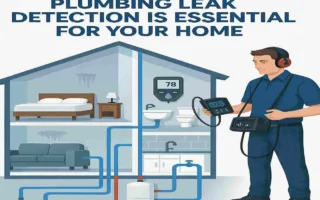Plumbing is one of the most crucial components of any home, ensuring that clean water flows in and wastewater flows out efficiently. However, like any system, plumbing can deteriorate over time, leading to leaks, low water pressure, and even safety hazards. When this happens, many homeowners find themselves asking, “How much to re-plumb a house?”
What Is Replumbing and Why Is It Necessary?

Replumbing is the process of replacing a home’s entire plumbing system, including pipes, fittings, and fixtures. This extensive undertaking is sometimes necessary when the existing plumbing has reached the end of its lifespan or has suffered significant damage.
Some common signs that indicate replumbing may be needed include:
- Frequent leaks or pipe bursts
- Low water pressure
- Discoloured or foul-smelling water
- Visible corrosion on pipes
- Old, outdated piping materials (e.g., lead or galvanised steel)
Replumbing offers several benefits, such as improved water quality, increased water pressure, and enhanced safety by reducing the risk of leaks and water damage. Additionally, upgrading to modern, efficient plumbing materials can help lower your water bills and boost your home’s value.
Key Factors That Affect How Much to Replumb a House
The cost to replumb a house can vary significantly depending on several key factors:
- Size of the house: Larger homes with more bathrooms and plumbing fixtures will generally cost more to replumb than smaller houses.
- Type of plumbing system and materials: The choice of piping material (e.g., copper, PVC, PEX) can significantly impact the overall cost, with some materials being more expensive than others.
- Accessibility of pipes: If the pipes are difficult to access, such as those hidden behind walls or under floors, the labour costs may increase.
- Age and condition of existing plumbing: Older homes with more extensive damage may require additional repairs or modifications, which can increase the total cost.
- Local labour and material costs: Plumbing rates and material prices can vary significantly by region, which affects the overall project expense.
- Permits and inspections: Many cities require permits for major plumbing work, which can add to the final cost.
- Potential need for additional repairs: In some cases, replumbing may reveal other issues, such as water damage or mould, that require attention and further investment.
Detailed Cost Breakdown of Replumbing a House
On average, replumbing a house can cost anywhere from $5,000 to $15,000 or more, depending on the factors mentioned above. Let’s take a closer look at the individual components that make up this cost:
Labor Costs
Plumbers typically charge by the hour or provide a fixed quote for the entire project. Hourly rates can range from $50 to $200 or more, depending on the plumber’s experience level and your location. For a full replumb, labour costs can easily reach several thousand dollars.
Material Costs
The cost of materials will depend on the type of pipes chosen:
- Copper pipes: $2 to $5 per linear foot
- PVC pipes: $0.50 to $2 per linear foot
- PEX pipes: $0.50 to $3 per linear foot
In addition to pipes, you’ll need to account for the cost of fittings, valves, and connectors, which can add several hundred to a few thousand dollars to the total.
Additional Replacement Costs
During a replumbing project, you may also need to replace fixtures such as faucets, showerheads, and toilets, as well as make updates to water heater connections. These additional costs can range from a few hundred to several thousand dollars.
Hidden Costs
Don’t forget to factor in the cost of permits, inspections, and debris removal, which can add several hundred dollars to the final bill.
Examples of Typical Costs
Here are some rough estimates for replumbing based on house size plumbing and layout:
- Small home (1-2 bathrooms): $5,000 to $10,000
- Medium home (3-4 bathrooms): $10,000 to $15,000
- Large home (5+ bathrooms): $15,000 to $25,000+
Cost Comparison: Replumbing Entire House vs. Partial Plumbing Replacement

In some cases, you can opt for partial plumbing replacement or spot repairs instead of a full replumb. This can be a more cost-effective solution if the issues are localised and the majority of your plumbing is still in good condition.
However, if your plumbing system is old or extensively damaged, a full replumb may be the better long-term investment. While it comes with a higher upfront cost, it can help prevent future leaks, water damage, and costly repairs.
Ultimately, the decision between full replumbing and partial replacement will depend on your specific situation, budget, and long-term goals for your home.
Signs You Might Need to Replumb Your House Soon
If you’re unsure whether replumbing is necessary, keep an eye out for these warning signs:
- Frequent leaks or pipe bursts
- Consistently low water pressure
- Visible corrosion or damage on pipes
- Water discolouration or odd smells
- Unexplained spikes in water bills
Ignoring these issues can lead to more extensive damage and higher repair costs down the line. If you notice any of these red flags, it’s best to consult a professional plumber to assess your plumbing system and determine the most appropriate course of action.
DIY vs. Professional Replumbing: What You Should Know
While it may be tempting to tackle replumbing as a DIY project to save money, it’s crucial to understand the risks involved. Plumbing is a complex system that requires specialised knowledge and skills. Attempting to replumb your entire house without proper training can lead to costly mistakes, water damage, and even health hazards.
Hiring licensed, experienced plumbers ensures that the job is done correctly, safely, and in compliance with all relevant codes. Professional plumbers have the tools, expertise, and insurance to handle any issues that may arise during the replumbing process.
To find reputable plumbers in your area:
- Ask for recommendations from friends, family, or neighbours
- Check online reviews and ratings
- Verify licenses and insurance
- Get detailed, written estimates from multiple plumbers
- Inquire about warranties and guarantees
Choosing the right professional may cost more upfront, but it can save you money and headaches in the long run by ensuring a quality, lasting plumbing system.
Tips for Reducing Replumbing Costs Without Sacrificing Quality
While replumbing is a significant investment, there are ways to manage costs without cutting corners on quality:
- Choose cost-effective materials: Discuss material options with your plumber to find a balance between durability and affordability.
- Plan and schedule efficiently: Coordinate with your plumber to minimise downtime and avoid rush charges.
- Get multiple quotes: Obtain detailed estimates from several reputable plumbers to compare prices and services.
- Negotiate prices: Don’t be afraid to ask for discounts or package deals, especially if you have a large project.
By being proactive and strategic in your approach, you can keep your replumbing costs under control while still ensuring a high-quality, reliable plumbing system.




